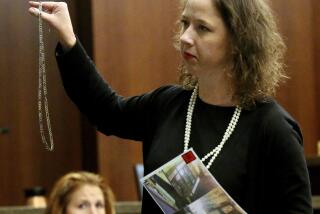Fear Hinders Plane Crash Inquiries
- Share via
WASHINGTON — Fears of criminal prosecution are reducing cooperation in investigations to determine the causes of air crashes and other transportation accidents, experts at a National Transportation Safety Board symposium said this week.
Attorneys, transportation executives and federal officials agreed that during the last decade the NTSB’s efforts to determine the causes of such mishaps has been increasingly accompanied--and in some cases muscled out--by law enforcement agencies and prosecutors attempting to fix blame.
“Individuals will retain counsel who will advise their clients to think long and hard before giving testimony to the NTSB that may ultimately be used by government prosecutors seeking to build a criminal case against them,” attorney Martin Raskin said.
“Most competent counsel experienced in criminal investigations will advise their clients to assert the 5th Amendment rather than risk self-incrimination,” Raskin added. “The NTSB’s legitimate mandate to act in the interest of the flying public may be thwarted.”
ValuJet Crash Turning Point in Investigations
NTSB officials say that if they are unable to move swiftly to complete their investigations, there could be crucial delays in determining why planes have crashed--and how to make air travel safer.
“My investigators have been stymied by the prospect of criminal prosecutions,” said Jim Hall, NTSB chairman and a participant in the symposium, before a House subcommittee several months ago. “A number of our investigative activities have been suspended because most of the central players will not talk to us.”
Raskin is well qualified to talk about the subject. He was one of the defense attorneys in prosecutions stemming from the 1996 ValuJet crash in the Florida Everglades, a case that many consider a turning point in air crash investigations.
Criminal prosecutions once were a rarity in major transportation disasters. ValuJet changed all that.
Within days of the Everglades crash, it became apparent that the probable cause of the disaster was a cargo hold fire fueled by oxygen generators that had been removed from other planes being modified for ValuJet by SabreTech, a subcontractor.
“It soon became clear that both federal and state prosecuting authorities were investigating the accident and that ValuJet, SabreTech and their employees were subjects of those investigations,” Raskin said. “FBI agents and state law enforcement authorities visited employees at their homes. . . . In the months that followed, grand jury subpoenas were issued.”
A 24-count federal indictment charged SabreTech and three of its employees with conspiring to falsify aircraft records, falsifying aircraft records, violating hazardous materials regulations and placing a destructive device aboard an airplane. In addition, homicide charges were filed by state prosecutors.
The employees were acquitted of the federal charges, but SabreTech was found guilty of seven counts of violating hazardous-materials regulations, with sentencing set for June. The homicide trial is scheduled for October.
Airlines Now Fear Criminal Prosecution
Raskin described the ValuJet case as “a particularly visible bellwether of a growing focus on criminal enforcement in the aviation industry.”
The 1997 crash of a Fine Air cargo jet in Miami ultimately was determined to have been caused by improperly loaded air freight. A criminal investigation led to various charges, including destruction and covering up of evidence. Under plea agreements, Fine Air and the cargo-handling firm, Aeromar Airlines, pleaded guilty to several of the charges and will be fined a total of about $5 million.
In 1999, federal prosecutors began investigating possible criminal misconduct in another transportation case involving the rupture of a gasoline pipeline and a subsequent fire in Bellingham, Wash., that claimed three lives.
And FBI and Department of Transportation investigators are currently questioning mechanics in connection with another NTSB case: the fatal crash of Alaska Airlines Flight 261 off Anacapa Island, Calif., in January.
In the ValuJet crash, the NTSB got to most of the people it wanted to talk to before the FBI and local police began asking questions. That apparently was true in the Fine Air case as well.
But now the cops are moving faster.
The U.S. attorney’s office got there first in the pipeline case, thus far preventing the NTSB from examining the pipe for fear of contamination of criminal evidence. Some pipeline company employees have clammed up, invoking their 5th Amendment rights. Others say the company has refused to let them meet with NTSB investigators.
Several Alaska Airlines mechanics have expressed concerns about the possibility of criminal prosecutions or retaliation from their employers if they talk too much.
“The biggest barrier to information gathering and information sharing is fear,” said Marty Matheson, a business executive and representative of the American Petroleum Institute, an industry group.
But others, including Steven P. Solow, chief of the Justice Department’s environmental crimes unit, said that criminal prosecutions are essential to deter deliberate acts--as opposed to unwitting human errors--that lead to transportation disasters.
He said a number of factors should be considered before criminal prosecution is undertaken, including the sufficiency of evidence of criminal violations, the evidence of criminal intent, the history of regulatory offenses by the alleged offender and whether prosecution is really the best remedy.
Some attorneys suggested the possibility that some sort of immunity could be worked out, protecting those who provide information to the NTSB from having it used against them in subsequent prosecutions.
“The NTSB and prosecutors can work together,” said Thomas Scott, the U.S. attorney in South Florida. “Their interests are not mutually exclusive.”
More to Read
Sign up for Essential California
The most important California stories and recommendations in your inbox every morning.
You may occasionally receive promotional content from the Los Angeles Times.













